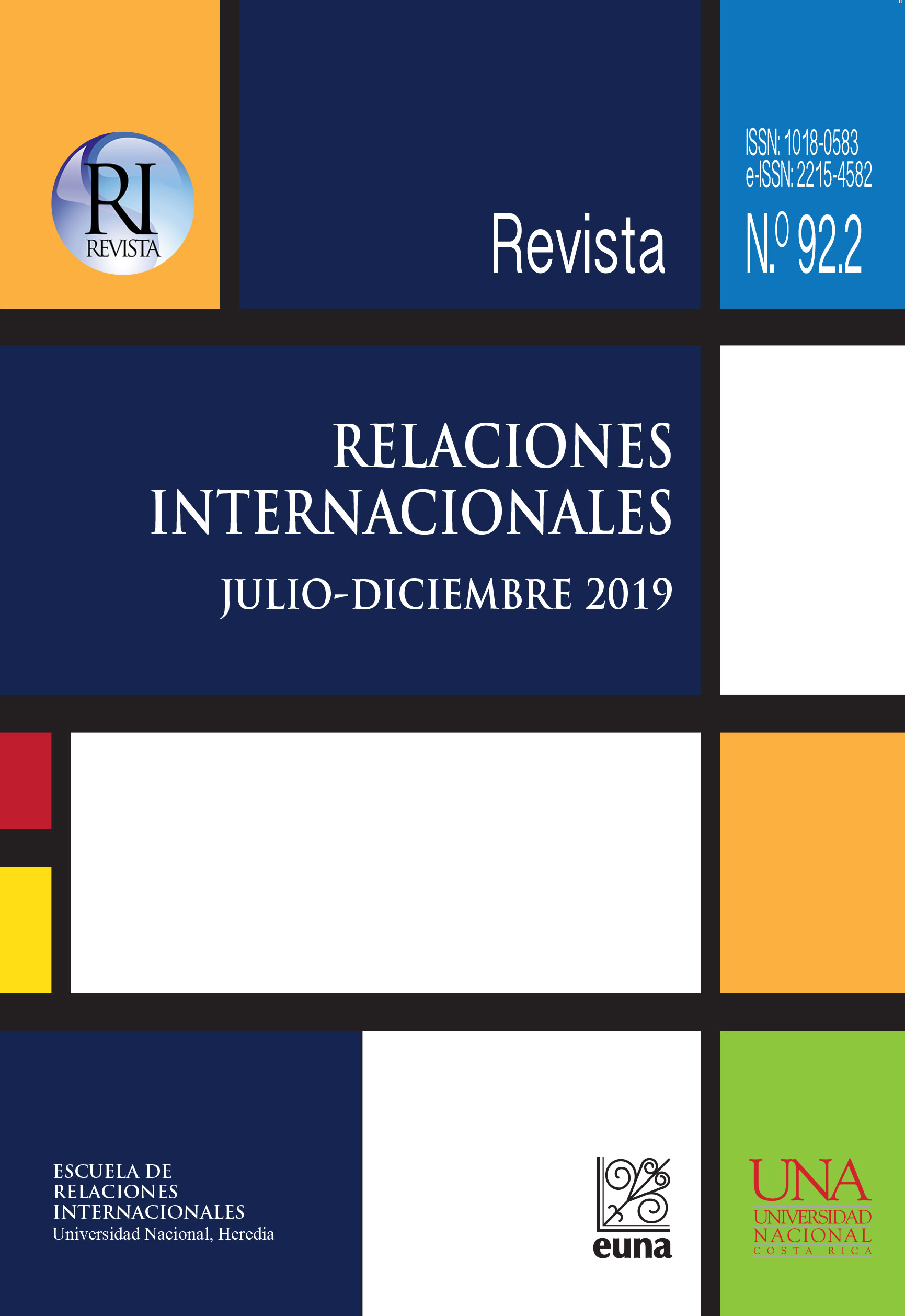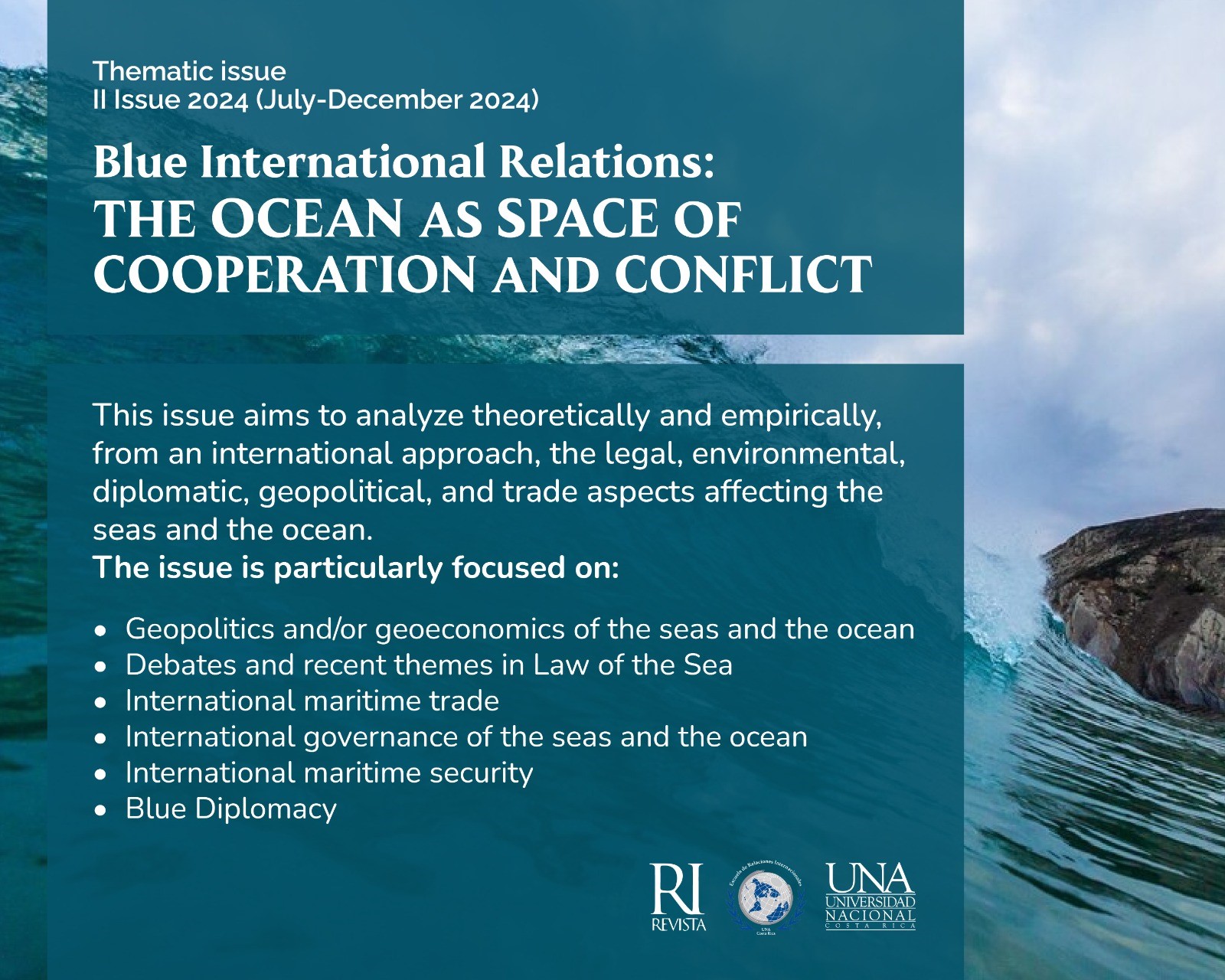Diffusion of the human security approach in Costa Rica: between the acceptance and resistance of the epistemic communities
DOI:
https://doi.org/10.15359/ri.92-2.5Keywords:
diffusion, human scurity, epistemic community, human rights, Costa RicaAbstract
Policy diffusion studies seldom explain the role that epistemic communities can play as promoters or blockers in the propagation of an idea or policy. The objective of this article is to analyze the role of the Costa Rican epistemic community of human rights in the diffusion of the human security approach. The study suggests that human rights community have played an ambiguous role in spreading the human security approach in Costa Rica, which ranks between acceptance and rejection. In addition, this research finds that the mechanisms of coercion, competition, and socialization may have an influence on actors other than the State or government, such as international organizations.
References
Acharya, A. (2004). How Ideas Spread: Whose Norms Matter? Norm Localization and Institutional Change in Asian Regionalism. International Organization, 58(2), 239-275.
Adler, E., & Haas, P. (1992). Conclusion: Epistemic Communities, World Order, and the Creation of a Reflective Research Program. En P. Haas (Ed.), Knowledge, Power and International Policy Coordination (pp. 367-390). Recuperado de http://www.jstor.org/stable/2706960
Alpízar, I. (2011). Derechos humanos en Costa Rica. Revista Latinoamericana de Derechos Humanos, 22(2), 21-38.
Antoniades, A. (2003). Epistemic Communities, Epistemes and the Construction of (World) Politics. Global Society, 17(1), 21-38. https://doi.org/10.1080/0953732032000053980
Barnett, M., & Finnemore, M. (2004). Rules for the World: International Organizations in Global Politics. Ithaca, NY: Cornell University Press.
Buzan, B. (2004). A Reductionist, Idealistic Notion that Adds Little Analytical Value. Security Dialogue, 35(3), 369-370. https://doi.org/10.1177/096701060403500326
Cascante, H., Fonseca, R., Méndez, M., Morales, M., Chacón, K., & Jiménez, L. (2016). Costa Rica y su política exterior 2015. ¿Hacia una política exterior de estado? Heredia: Escuela de Relaciones Internacionales de la Universidad Nacional.
Checkel, J. (1999). Norms, Institutions, and National Identity in Contemporary Europe. International Studies Quarterly, 43(1), 84-114. https://doi.org/10.1111/0020-8833.00112
Cross, M. K. D. (2013). Rethinking Epistemic Communities Twenty Years Later. Review of International Studies, 39(01), 137-160. https://doi.org/10.1017/S0260210512000034
Daley, D., & Garand, J. (2005). Horizontal Diffusion, Vertical Diffusion, and Internal Pressure in State Environmental Policymaking, 1989-1998. American Politics Research, 33(5), 615-644. https://doi.org/10.1177/1532673X04273416
Dobbin, F., Simmons, B., & Garrett, G. (2007). The Global Diffusion of Public Policies: Social Construction, Coercion, Competition, or Learning? Annual Review of Sociology, 33, 449-472. https://doi.org/10.1146/annurev.soc.33.090106.142507
Dunlop, C. (2013). Epistemic Communities. En E. Araral, S. Fritzen, M. Howlett, M. Ramesh, & X. Wu (Eds.), Routledge Handbook of Public Policy (pp. 229-243). Recuperado de https://books.google.com.ec/books/about/Routledge_Handbook_of_Public_Policy.html?hl=es&id=AimVtmIb4Z8C
Finnemore, M. (1993). International Organizations as Teachers of Norms: The United Nations Educational, Scientific, Cultural and Science Policy. International Organization, 47(04), 565-597. https://doi.org/10.1017/S0020818300028101
Finnemore, M. (1996). Norms, Culture, and World Politics: Insights from Sociology’s Institutionalism. International Organization, 50(02), 325-347. https://doi.org/10.1017/S0020818300028587
Finnemore, M., & Sikkink, K. (1998). International Norm Dynamics and Political Change. International Organization, 52(4), 887-917. https://doi.org/10.1162/002081898550789
Fuentes, C. (2012). Seguridad humana: referencias conceptuales y enfoque práctico para América Latina. En: Rojas Aravena, F (Org.). Seguridad humana: nuevos enfoques, (pp. 33–54). San José de Costa Rica: FLACSO.
Gilardi, F. (2012). Transnational Diffusion: Norms, Ideas, and Policies. En W. Carlsnaes, Risse Thomas, & B. Simmons (Eds.), Handbook of International Relations (pp. 453-477). Thousand Oaks: Sage.
Gilardi, F., & Wasserfallen, F. (2017, febrero 17). Policy Diffusion: Mechanisms and Practical Implications. Presentado en Governance Design Network (GDN) Workshop, Singapure. Recuperado de http://www.fabriziogilardi.org/resources/papers/Gilardi-Wasserfallen-2017.pdf
Gleditsch, K. S., & Ward, M. D. (2006). Diffusion and the International Context of Democratization. International Organization, 60(04). https://doi.org/10.1017/S0020818306060309
Graham, E., Shipan, C., & Volden, C. (2012). Review Article: The Diffusion of Policy Diffusion Research in Political Science. British Journal of Political Science, 43(3), 673-701. https://doi.org/10.1017/S0007123412000415
Haas, P. (1992). Introduction: Epistemic Communities and International Policy Coordination. En P. Haas (Ed.), Knowledge, Power and International Policy Coordination (pp. 1-35). Recuperado de https://www.unc.edu/~fbaum/teaching/articles/IO-1992-Haas.pdf
Haas, P. (2015). Epistemic Communities, Constructivism, and International Environmental Politics. Nueva York: Routledge.
Hobson, J. M., & Ramesh, M. (2002). Globalisation Makes of States What States Make of It: Between Agency and Structure in the State/Globalisation Debate. New Political Economy, 7(1), 5-22. https://doi.org/10.1080/13563460120115499
IIDH (Instituto Interamericano de Derechos Humanos). (2010). Proyecto «Desarrollo y promoción de la seguridad humana en América Latina». Recuperado 1 de febrero de 2016, de Seguridad humana en América Latina website: https://www.iidh.ed.cr/multic/default_12.aspx?contenidoid=a4f18ce8-c2b8-4b46-8034-df4cfe8de68c&Portal=IIDHSeguridad
Keck, M., & Sikkink, K. (1999). Transnational Advocacy Networks in International and Regional Politics. International Social Science Journal, 51(159), 89-101. https://doi.org/10.1111/1468-2451.00179
Kerr, P. (2006). Human Security. En A. Collins (Ed.), Contemporary security studies. Oxford: Oxford University Press.
Jiménez, I. A. (2011). Derechos humanos en Costa Rica. Revista Latinoamericana de Derechos Humanos, 22(2), 21–38.
Maggetti, M., & Gilardi, F. (2015). Problems (and Solutions) in the Measurement of Policy Diffusion Mechanisms. Journal of Public Policy, 36(01), 87–107. https://doi.org/10.1017/S0143814X1400035X
Martin, M., & Owen, T. (2014). Introduction. En M. Martin & T. Owen (Eds.), Routledge Handbook of Human Security (pp. 1-14). Nueva York: Routledge.
Meseguer, C., & Gilardi, F. (2008). Reflexiones sobre el debate de la difusión de políticas. Política y gobierno, 15(2), 315-351.
Morillas, P. (2006). Génesis y evolución de la expresión de la seguridad humana: Un repaso histórico. Revista CIDOB d’Afers Internacionals, 76, 47-58.
OIM, O. I. para las M. (2017). Programa Conjunto para mejorar la Seguridad Humana de Migrantes Temporales Ngäbe y Buglé en Costa Rica y Panamá | OIM Costa Rica. Recuperado 4 de marzo de 2017, de OIM Costa Rica website: http://costarica.iom.int/site/programa-conjunto-para-mejorar-la-seguridad-humana-de-migrantes-temporales-ng%C3%A4be-y-bugl%C3%A9-en-costa
Oliveira, O. P. de, & Faria, C. P. de. (2017). Policy Transfer, Diffusion, and Circulation: Research Traditions and the State of the Discipline in Brazil. Novos Estudos, 36(1), 13-34.
ONU, C. de S. H. (2003). Human Security Now. Nueva York: Commission on Human Security.
Orozco, G. (2016). Comunidades epistémicas en los estudios de seguridad y la interpretación del orden mundial. Desafíos, 28(1), 337-371. https://doi.org/10.12804/desafios28.1.2016.08
Osorio, C. (2014). La difusión de programas de transferencia condicionada en América Latina (Tesis de doctorado). Universitat Pompeu Fabra, Barcelona.
Osorio, C. (2015). Mecanismos de difusión de los Programas de Transferencia Condicionada en América Latina. El caso chileno. Íconos: Revista de Ciencias Sociales, 53, 31-48.
Paris, R. (2001). Human Security: Paradigm Shift or Hot Air? International Security, 26(2), 87-102.
Pérez, K. (2006). El concepto y el uso de la seguridad humana: Análisis crítico de sus potencialidades y riesgos. Revista CIDOB d’Afers Internacionals, (76), 59-77.
PNUD Costa Rica (Programa de las Naciones Unidas para el Desarrollo). (2006). Venciendo el temor: (In)seguridad ciudadana y desarrollo humano en Costa Rica. Recuperado de http://www.pnud.or.cr/images/stories/downloads/InformeNacional.pdf
PNUD (Programa de las Naciones Unidas para el Desarrollo). (1994). Informe sobre desarrollo humano 1994. Madrid: Fondo de Cultura Económica.
Ring, J. (2014). The Diffusion of Norms in the International System (Tesis doctoral, Universidad de Iowa). Recuperado de http://ir.uiowa.edu/etd/1386
Risse, T., Ropp, S. C., & Sikkink, K. (Eds.). (1999). The Power of Human Rights: International Norms and Domestic Change. Cambridge: Cambridge University Press.
Rojas, F., & Álvarez, A. (2012). Seguridad humana: Un estado del arte. En Rojas Francisco (Ed.), Seguridad humana: Nuevos enfoques. San José de Costa Rica: FLACSO.
Solingen, E. (2012). Of Dominoes and Firewalls: The Domestic, Regional, and Global Politics of International Diffusion. International Studies Quarterly, 56(4), 631-644. https://doi.org/10.1111/isqu.12034
Sorj, B. (2005). Seguridad, seguridad humana y América Latina. Sur – Revista internacional de Derechos Humanos, 3(2), 40-59.
Sugiyama, N. B. (2008). Theories of Policy Diffusion: Social Sector Reform in Brazil. Comparative Political Studies, 41(2), 193-216. https://doi.org/10.1177/0010414007300916
UNTFHS, F. F. de las N. U. para la S. H. (2011, junio 17). Directrices para el Fondo Fiduciario de las Naciones Unidas para la Seguridad Humana. Recuperado de https://docs.unocha.org/sites/dms/HSU/Guidelines%20Spanish%20version%20-%206th%20revision.pdf
UNTFHS, F. F. de las N. U. para la S. H. (2015). La seguridad humana en las Naciones Unidas. Recuperado de Dependencia de Seguridad Humana, Secretaría de las Naciones Unidas website: http://www.un.org/humansecurity/sites/www.un.org.humansecurity/files/untfhs_booklet_-_spanish.pdf
Wendt, A. (1987). The Agent-structure Problem in International Relations Theory. International Organization, 41(03), 335-370. https://doi.org/10.1017/S002081830002751X
Wendt, A. (1999). Social Theory of International Politics. Nueva York: Cambridge University Press.
Weyland, K. (2005). Theories of Policy Diffusion: Lessons from Latin American Pension Reform. World Politics, 57(2), 262-295.
Weyland, K. (2006). Bounded Rationality and Policy Diffusion: Social Sector Reform in Latin America. Nueva Jersey: Princeton University Press.
Weyland, K. (2009). The Diffusion of Revolution: ‘1848’ in Europe and Latin America. International Organization, 63(03), 391–423. https://doi.org/10.1017/S0020818309090146
Zito, A. R. (2001). Epistemic communities, collective entrepreneurship and European integration. Journal of European Public Policy, 8(4), 585-603. https://doi.org/10.1080/13501760110064401
Downloads
Published
How to Cite
Issue
Section
License

Revista de Relaciones Internacionales por Universidad Nacional de Costa Rica está bajo una Licencia Creative Commons Atribución-NoComercial-SinDerivar 4.0 Internacional








1.png)







3.png)
